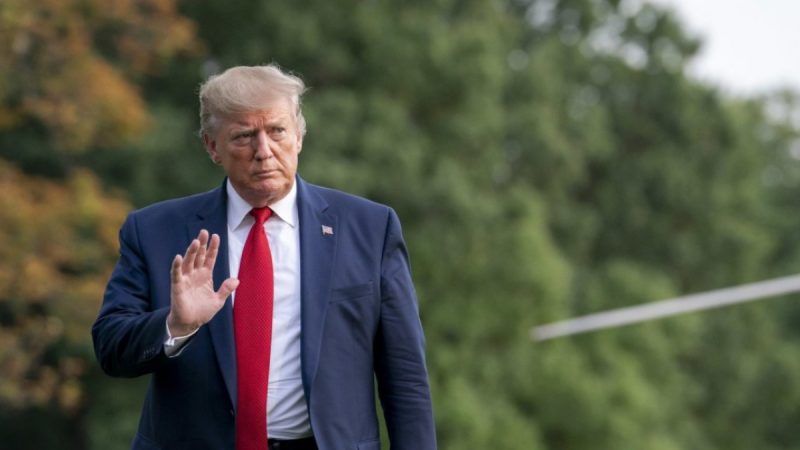Republican Senators Say the Truth Is Irrelevant in Evaluating the Gravity of Trump's Misconduct
Republicans are setting a dangerous precedent they may come to regret the next time a Democrat occupies the White House.

Donald Trump's lawyers have vigorously disputed the facts alleged in the articles of impeachment against him. But their fallback, bottom-line argument, which is especially important now that former National Security Adviser John Bolton seems prepared to confirm the aid-for-investigations quid pro quo at the heart of the House's case, is that the president's conduct would not constitute an impeachable offense even if he did everything the Democrats say he did. Leaving aside the questionable merits of proceeding with a hasty, party-line impeachment less than a year before Trump faces re-election, that position sets a dangerous precedent that Republicans may come to regret.
Harvard law professor Alan Dershowitz, a member of Trump's legal team who used to agree with the scholarly consensus that impeachment does not require a criminal offense, changed his mind in 2018, then changed it again this year. His current position is that impeachment requires "criminal-like behavior akin to treason and bribery," which for some reason does not include extorting the Ukrainian government into announcing an investigation of a political rival by delaying congressionally approved military aid.
Republican senators who dismiss the significance of Bolton's potential testimony are leaning hard on that dubious conclusion. "I don't think anything he says changes the facts," Majority Whip John Thune (R–S.D.) told CNN. "I think people kind of know what the fact pattern is….There's already that evidence on the record." Sen Kevin Cramer (R–N.D.) concurred: "I think Bolton sounds like a lot of the other witnesses, frankly. I don't know that he's got a lot new to add to it."
Thune and Cramer, in other words, think Democrats have already established that Trump used the military aid as leverage to obtain the "favor" he wanted from Ukrainian President Volodymyr Zelenskiy: "a major investigation into the Bidens," as the president himself put it. But although Trump and his lawyers have strenuously denied that nexus, Thune and Cramer say it does not matter.
Sens. Roger Wicker (R–Miss.), Roy Blunt (R–Mo.), Tim Scott (R–S.C.), John Cornyn (R–Texas), and Thom Tillis (R–N.C.) agreed that the quid pro quo is irrelevant to the question of whether Trump committed an impeachable offense. "I don't think the testimony of Ambassador Bolton would be helpful because I basically am in agreement with the very scholarly approach that Mr. Dershowitz took that there's no article there that's grounds for impeachment and removal," Wicker told CNN.
These senators' incuriosity is more than a little troubling given the details of the accusations against Trump. Here are the key alleged facts, which for the sake of this argument we have to assume are true:
1. Trump did not really care about rooting out official corruption in Ukraine or any other legitimate foreign policy goal. He pressed the Ukrainian government to announce an investigation of former Vice President Joe Biden because he hoped to improve his chances of winning another term by discrediting the Democratic presidential contender he views as the biggest threat to his re-election.
2. The claim that Biden improperly used his influence as vice president to protect his son from a Ukrainian corruption investigation, as Trump alleged in his July 25 phone call with Zelenskiy, is transparently spurious. In pressing for the removal of Prosecutor General Viktor Shokin, Biden was simply implementing Obama administration policy, which was consistent with a widely held view that Shokin was ineffectual and corrupt. Hence there was no legitimate reason for the Ukrainian government to investigate Biden.
3. Trump was so keen on tarnishing Biden that he jeopardized Ukraine's ability to defend itself against Russian aggression and compromised U.S. foreign policy goals, to the dismay of all his top advisers and members of Congress from both parties.
4. Trump was so keen on tarnishing Biden that he did not care whether his aid freeze was legal, which it wasn't, or whether he was unconstitutionally usurping the legislative branch's authority to appropriate taxpayer money, which he was.
5. To cover up this unseemly scheme, Trump lied over and over again about what he did and why, and he stonewalled the House's attempt to investigate the matter by refusing to provide relevant documents and telling current and former administration officials that they should not testify.
Some of these claims are well-established, while some rely mainly on circumstantial evidence and debatable inferences that could be reinforced by Bolton's testimony. But Thune et al. say the truth of these allegations is irrelevant for the purpose of deciding whether Trump's removal is constitutionally justified. Or as Dershowitz put it, "Nothing in the Bolton revelations—even if true—would rise to the level of an abuse of power or an impeachable offense."
Suppose Bolton testified that Trump told him, in so many words, that he was blocking the military aid to Ukraine solely because he wanted to undermine Biden as a presidential candidate by making him look corrupt. In Dershowitz's view, apparently, that would not constitute even an abuse of power, let alone an impeachable offense.
The Democrats say Trump abused his power for personal gain by encouraging a foreign government to unfairly impugn the integrity of a political rival. To further that goal, they say, he violated the law (the Impoundment Control Act), the Constitution (by disregarding the separation of powers), and his oath of office (in which he promised to "faithfully execute" his office and "preserve, protect and defend the Constitution of the United States"). If the allegations against him are true, Trump also undermined the rule of law in Ukraine by encouraging Zelenskiy to abuse his power, since an investigation of Biden was justified only by Trump's domestic political interests.
This is the Republican response, which we should keep in mind the next time a Democrat occupies the White House: So what?


Show Comments (246)